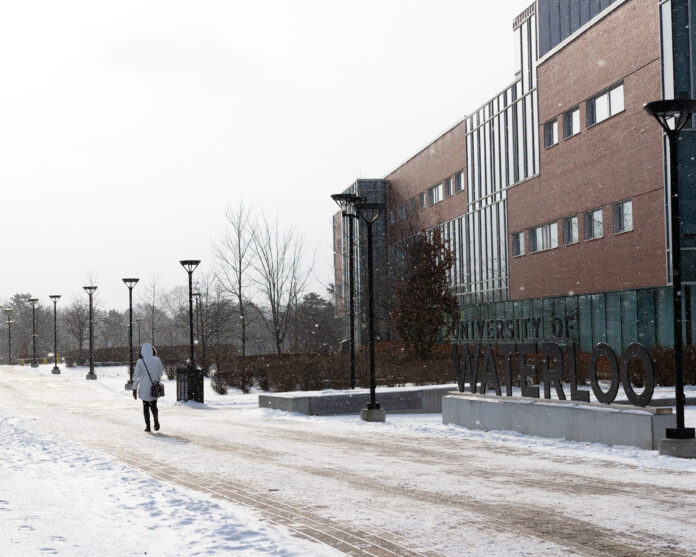On Jan. 17, the University of Waterloo announced an extension to the current remote learning and working arrangements until at least Feb. 7.
The announcement was initially sent to the UW community in a message titled “Confirming our return to in-person learning and work in February,” by Vivek Goel, President and Vice-Chancellor, and James W. E. Rush, Vice-President, Academic and Provost.
Until the current restrictions are removed, most teaching and learning will remain online. Essential in-person learning activities are allowed to continue, with safety measures like masking and capacity limits in place.
Additionally, campus recreation facilities are closed and food services on campus are takeout only.
Community members interested in knowing more about the return to in-person activity can attend a President’s Forum event on Wed. Feb 2 at 1:30 pm. Registration is required.
Matthew Bilopavlovic, a fourth-year honours physics student, called the extension “disappointing but not surprising.”
Abigail Constable, a third-year liberal studies student, expressed a similar sentiment. “I fully expected this. I chose all online courses because I didn’t want to deal with the will they/won’t they mess. It’s pretty obvious that this was coming,” she said.
The Jan. 17 announcement from UW acknowledged the challenges associated with frequently changing recommendations and restrictions.
“We know that the uncertainty brought by the latest wave of COVID-19 is disruptive and that many of us are keen to know when we can get back to more in-person learning and working,” the message read.
Accordingly, the university promised to provide at least 14 days’ notice before resuming in-person activity and encouraged students to prepare to be in the region by the reopening date.
While UW initially planned to return to pre-pandemic levels of in-person instruction for the Winter 2022 term, rising COVID-19 cases across the province resulted in increasing restrictions beginning near the end of the Fall 2021 term.
Due to the highly infectious nature of the most recent wave of the pandemic, which has been largely attributed to the Omnicron variant, the university began to reduce in-person activity. On Dec. 16 2021 the university announced that the upcoming academic term would begin primarily online, with an expected return to in-person learning and working on Jan. 24, 2022.
Shortly thereafter, the Ontario government announced the implementation of a modified version of Step Two of the Roadmap to Reopen, which began on Jan. 5 and which will remain in effect until at least Jan. 26.
Among the many restrictions in place under the modified Step Two are capacity limits for social and retail environments and mandatory remote work whenever possible.
In accordance with provincial requirements and recommendations from public health officials, UW extended the remote period, first until Jan. 27 and now until at least early February.
While the UW population of students and employees has a high rate of vaccination and is therefore well protected against severe illness from COVID-19, the extension announcement addressed the ongoing strain to the health system due to the pandemic as well as an increased impact that is predicted to follow the ongoing wave.
“We need to continue to do our part to limit the pressure on our community and the local health system by continuing to limit in-person contact,” the message read.
UW students, some of whom have not been on campus for almost two years, have conveyed similar attitudes. “I understand why these restrictions are necessary, but it doesn’t make them easier to manage,” said Zofia Washington, a fourth-year science psychology student. “I hope the community comes together to help reduce the spread.”
To help return to in-person experiences as soon as possible, the university recommends getting booster doses of the vaccine, which are available to all Ontario residents 18 years of age and older who received their second dose of the vaccine at least three months (84 days) ago.
According to the National Advisory Committee on Immunization (NACI), if you received an mRNA vaccine (Pfizer or Moderna) for your second dose, you can safely take either Moderna or Pfizer for your third dose. Due to similarities in the technology between the two mRNA options, vaccine mixing has been approved by public health departments across Canada, the United States and several other countries.
UW’s vaccine centre is open to all UW students, employees and family members of students and employees. To book an appointment at the centre, call 519-888-4096.
You can also visit the City of Waterloo website to book an appointment at a regional vaccination clinic or check availability at pharmacies near you, or you can check online resources that help people find available shots, such as Vaccine Ontario and Vaccine Hunters.
In addition to vaccination, the university recommends wearing well-fitting masks with multiple layers including an effective filter layer. Information about effective masks is available through the Public Health Agency of Canada.
Lastly, the university encourages people to remain vigilant and follow public health guidelines. While eligibility for PCR testing is now limited, all Ontarians have access to self-assessment tools that provide advice for how to proceed if you have a suspected exposure or are showing symptoms.






























